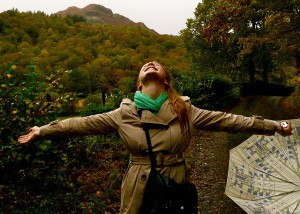I’m a pie maker, a “tree-hugger,” a musician, and a lover of Assyrian art. And I’m an English major.
When I’m not cooking curry or eating desserts, I’m usually traveling. I’ve been all over the United States, from California Adventures to Disneyworld, from Pike’s Peak to Times Square. Last Fall semester, I explored France, Italy, Scotland, and England, enjoying art, food, music, and cultures different from my own. While I love doing yoga in ancient ruins and being enraptured by nature, I’ve learned that reading—as cliché as this is going to seem—is another way to go on adventures by exploring how a writer expresses what it means to be human.
I first decided to be an English major because I had lofty goals: I wanted to be a writer and to change the world and to make people happy. Although these are still my goals, I’ve realized that there are many ways to learn and to feel that I had never before realized were possible. Learning how to think and learning new perspectives has enabled me to stretch myself—as a scholar, as a citizen, as a friend, as a daughter, as a child of God. Our universal status of all being children of a loving and an all-powerful God does not mean that our existence here on earth is completely and totally universal.
Modernist writers Virginia Woolf and James Joyce show me their world of determining who you are in a broken, changing world. The experiences of Buchi Emecheta and Ama Ata Aidoo show me their world of being African and the trials they endured. John D. Fitzgerald, just as much as F. Scott Fitzgerald, shows me a world of what it can mean to be American, of struggling in the American West or with the American dream. And there’s a beauty in that adventure, that universal search of what it means to be human.
One of my favorite books is Viktor E. Frankl’s Man’s Search for Meaning
Check out my blog! The bippity boppity beautiful blog
Katie serves as secretary for the English Society

